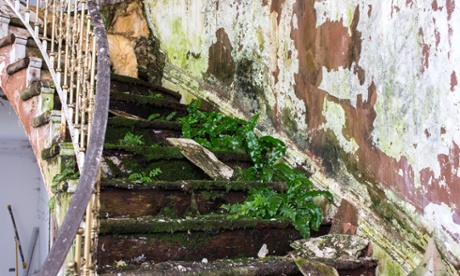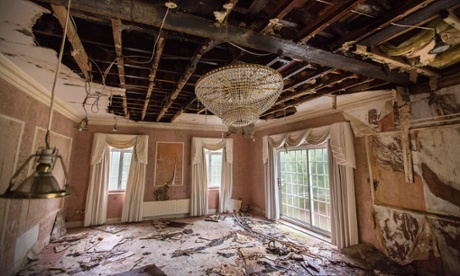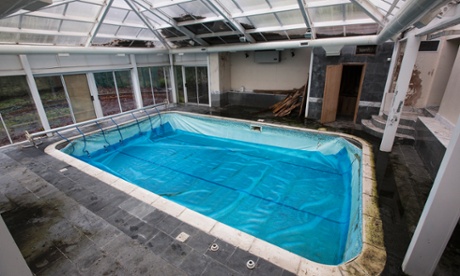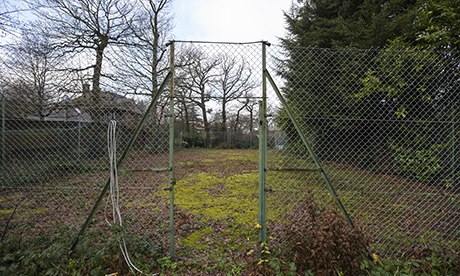
A third of the mansions on the most expensive stretch of London's "Billionaires Row" are standing empty, including several huge houses that have fallen into ruin after standing almost completely vacant for a quarter of a century.
A Guardian investigation has revealed there are an estimated £350m worth of vacant properties on the most prestigious stretch of The Bishops Avenue in north London, which last year was ranked as the second most expensive street in Britain.
 The Georgians on The Bishops Avenue. Photograph: Graeme Robertson
The Georgians on The Bishops Avenue. Photograph: Graeme Robertson
One property owner, the developer Anil Varma, has complained that the address has become "one of the most expensive wastelands in the world". At least 120 bedrooms are empty in the vacant properties.
The empty buildings include a row of 10 mansions worth £73m which have stood largely unused since they were bought between 1989 and 1993, it is believed on behalf of members of the Saudi royal family.
Exclusive access to now derelict properties has revealed that their condition is so poor in some cases that water streams down ballroom walls, ferns grow out of floors strewn with rubble from collapsed ceilings, and pigeon and owl skeletons lie scattered across rotting carpets.
 The Towers on The Bishops Avenue. Photograph: Graeme Robertson
The Towers on The Bishops Avenue. Photograph: Graeme Robertson
Yet, despite the properties falling into serious disrepair, it is likely that the Saudi owners of the portfolio made a significant profit from the £73m sale. The records available show that one of the mansions was worth only £1.125m in 1988.
The avenue, close to exclusive Highgate and Hampstead, is home to Richard Desmond, owner of Express Newspapers and Channel 5, members of the Saudi royal family, and Poju Zabludowicz, a billionaire art collector and philanthropist.
Homes are on the market for up to £65m but there are also 16 unoccupied mansions. More still are only used by their owners for short periods each year. Most of the properties in the most expensive part of the avenue are registered to companies in tax havens including the British Virgin Islands, Curaçao, the Bahamas, Panama, and the Channel Islands, allowing international owners to avoid paying stamp duty on the purchase and to remain anonymous.
 The property known as Redcroft. Photograph: Graeme Robertson
The property known as Redcroft. Photograph: Graeme Robertson
The revelations come at the same time as a growing political row over how empty properties can help solve a national housing shortage growing by more than 100,000 homes a year.
Boris Johnson has defied Downing Street to call for taxes to be cranked up on owners of vacant properties. He told City investors this month: "London homes aren't ... just blocks of bullion in the sky." He called for owners to live in their homes or rent them out. But the government has resisted attempts by councils, backed by the mayor, to multiply council tax rates on homes left empty for two years.
The proportion of empty properties on the most prestigious stretch of The Bishops Avenue is 10 times higher than for the rest of England, which has 710,000 empty homes.
"This illustrates everything that is wrong with the London housing market," said David Ireland, chief executive of the Homes from Empty Homes campaign group. "The high values are being used as an extreme investment vehicle at the expense of homes being homes.
"London's shortage of homes is so great that this feels immoral and dysfuctional. There are countless people in inadequate housing and here are homes on The Bishops Avenue that could be used."
 The Towers on The Bishops Avenue Photograph: Graeme Robertson
The Towers on The Bishops Avenue Photograph: Graeme Robertson
Unoccupied properties include a mansion seized following a high court judgment against a Kazakh businessman accused of a $6bn (£4.5bn) banking fraud and the repossessed home of the former Pakistani minister of privatisation, Waqar Ahmed Khan, where the windows have been sealed up with metal grilles.
Other houses show signs of limited habitation. The roof of one £10m home, registered in the name of a Saudi princess, is overgrown with plants and the signs on the ramshackle gates state it is under "24-hour manned guard".
"Not many true local residents live on the road," said Anil Varma, a property developer who is helping redevelop the former Saudi properties. "It is the likes of the royal families of Saudi Arabia and Brunei. They buy a property and don't do anything with it. No one has lived in some of these homes for 25 years and they are decaying. When we did the searches on some of them the water authorities said they had no records of any water being used."
 The Georgians on The Bishops Avenue Photograph: Graeme Robertson
The Georgians on The Bishops Avenue Photograph: Graeme Robertson
One resident of the avenue, Magdy Adib Ishak-Hannah, an Egypt-born doctor, said he had never met his neighbours and believed as few as three of the properties were occupied full-time.
Another resident from Iran, who asked not to be named, said: "95% of the people who live here don't actually live here. It is a terrible place to live really. It is very boring and the road is very busy. I don't think many people want to live in such big houses anyway."
 The Georgians on The Bishops Avenue Photograph: Graeme Robertson
The Georgians on The Bishops Avenue Photograph: Graeme Robertson
Estate agents and property developers said the avenue was in transition, with apartments under construction that would bring life back to the area, but said high vacancy rates were inevitable in an international market such as London where buyers come from the Middle East, Russia and increasingly China.
Trevor Abrahmsohn, an estate agent who has overseen 130 deals on The Bishops Avenue since 1976 through his company Glentree Estates, said any attempt to interfere with what owners do with their property would be wrong and the housing shortage should be tackled through reform of the planning system, wresting it from "political control".
He said: "Once you end people's right to buy something and do as they please with it you have a police state," he said. "One of the things people love about this country is its freedom and liberal views. You can't start affecting what people do with their assets. That is sacrosanct."
 The Towers on The Bishops Avenue Photograph: Graeme Robertson
The Towers on The Bishops Avenue Photograph: Graeme Robertson
Andreas Panayitou, a property tycoon selling one of the empty mansions, Heath Hall, for £65m, believes The Bishops Avenue is improving and more people are starting to spend more time living there.
But he admitted that the derelict Saudi properties "really let the road down". He said he fully agreed with Boris Johnson that London homes were not "blocks of bullion".
He said: "You don't want empty streets and people just parking their money. You need people to live in them or rent them."
But he argued against increasing taxes on unoccupied homes, which he said would be an "annoyance" that would make buyers choose Monte Carlo or Milan instead of London.

Δεν υπάρχουν σχόλια:
Δημοσίευση σχολίου